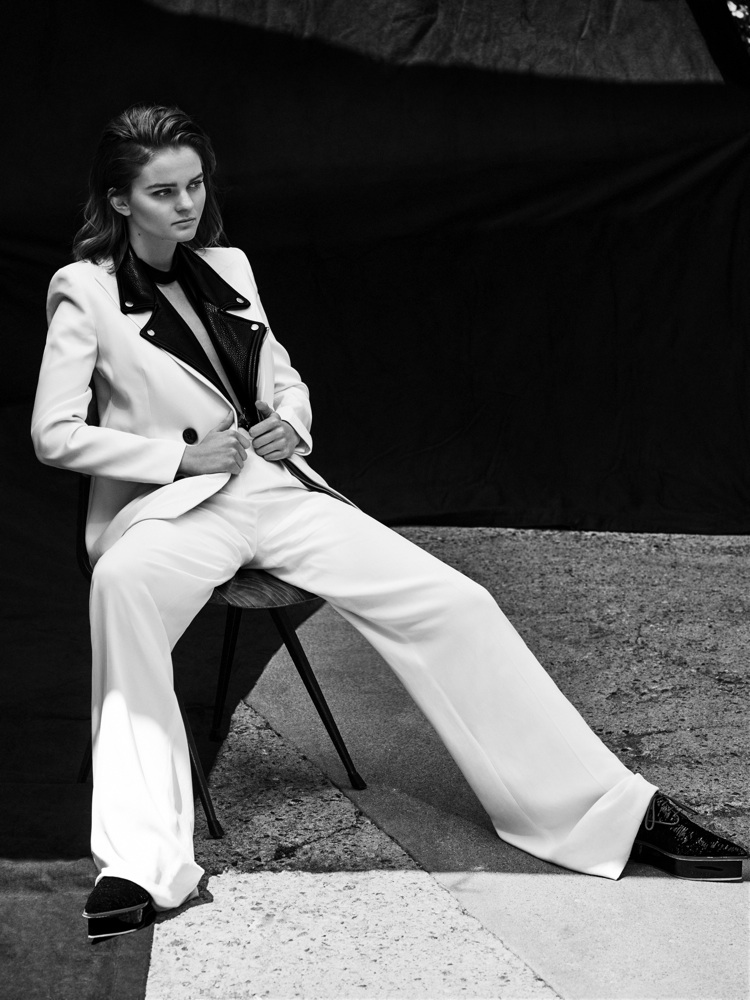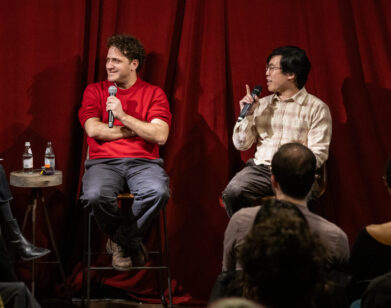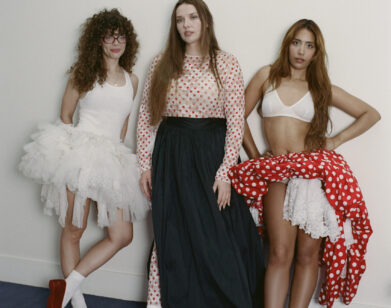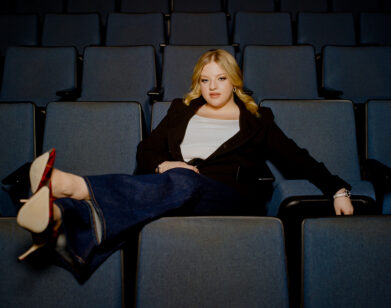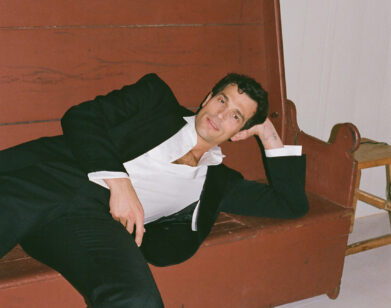Ray Donovan’s Dysfunctional Daughter
KERRIS DORSEY IN LOS ANGELES, APRIL 2016. PHOTOS: JONAS BRESNAN/ART DEPARTMENT. STYLING: DANI + EMMA. HAIR: BRIAN FISHER/THE WALL GROUP USING ORIBE. MAKEUP: RIKU CAMPO/ART DEPARTMENT USING MAKEUP FOREVER.
Murders, affairs, and FBI takedown schemes are not the average trappings of teenage-hood, but for Bridget Donovan, daughter of Ray in Showtime’s Ray Donovan, this level of dysfunction is simply reality. Her mother’s idea of sex education was threatening to “ruin [her] life” if she became pregnant by forcing her to keep the baby. Her boyfriend Marvin was murdered in front of her. She had an affair with her high school teacher Mr. Donellen (ending with her father beating said teacher), and wrapped Season Three by running away from home. While such plot twists could potentially leave an actor disengaged, operating at the whim of sharp turns of storyline, Kerris Dorsey—the 18-year-old actor behind Bridget—has maintained a firm grasp on her character over the past three seasons.
“Marvin definitely informed how she approaches men in general and people in general, and I think that maybe she does still crave a little bit of that danger that she felt with him, even though it got everyone in trouble,” Dorsey says of her character. “I think that’s why she’s gravitating towards Donellen. He has a past and has something that she identifies with. His wife has died and she really sees herself in him. He understands her in a way that I think her family hasn’t and a lot of her friends don’t,” she continues. “She has experiences with men, she has a boyfriend, but she’s not defined by that. Every experience is taken into the total fabric of her as a person.”
Dorsey, who was raised and still lives in the suburbs of L.A., began acting at age five. Since then she has landed roles in films such as Walk The Line and Moneyball, and, in 2011, she finished a six-year run on ABC’s Brothers & Sisters. She tells us she is now in the midst of giving herself “a film education”—she is a fan of Scorsese, Fincher, and Wes Anderson—and until the end of July she’ll be on set filming the fourth season of Ray Donovan, which begins airing next week. Come fall, she plans to attend the University of California, Santa Barbara.
HALEY WEISS: What attracted you to Bridget when you read the first script for Ray Donovan?
KERRIS DORSEY: I was 14 when I auditioned and I think that being a young woman in the acting world, it’s hard to find a character that’s not just coming in for one scene or being bratty, [who’s not] just a prop for the storyline. I liked that the character had her own world, her own opinions, and a lot of layers to her. I could already tell from the first episode script that that was the case for Bridget. Often when you’re a teenage girl you get sent characters that are so unenjoyable and unexciting.
WEISS: Do you think Bridget is fated to turn out like her dad and her family? To what degree do you think she can fight becoming more and more like the people around her?
DORSEY: I think if anyone has a chance it’s her. But I do think that growing up in that environment, that’s your world and that’s your family, and as much as Bridget would like to distance herself, ultimately she’s always going to come back to the Donovan family because there’s kind of a magnetic pull. Also, she loves everyone; it’s hard to forget how much you love even the most dysfunctional people in your life. The Donovan family is sort of cursed and there’s a little bit of that to her, but I think she’s going to fight to get out and I guess we’ll see whether or not she succeeds. I’m rooting for her, but, as an actor, it’s more fun to play the messed up characters, so I’m also rooting for a downward spiral. [laughs]
WEISS: What has been the most challenging scene or storyline on the show thus far?
DORSEY: I think everything has been challenging in a different way. A lot of the scenes with Marvin, my boyfriend in Seasons One and Two, were hard and the emotional fallout of him being shot. That scene specifically was really hard and there are a couple episodes following. Portraying someone who is dealing with grief, especially that much trauma and that much grief, is an interesting mindset to get into. On set we’re all really close and we were really over the crying at the end of the season. We would spend days just sitting in my room, doing all of my scenes where I’m just crying and crying and crying. We were ready for it to be done.
WEISS: How do you prepare for those scenes? Do you listen to music?
DORSEY: I listen to music because that’s such a huge part of my process, not to sound super pretentious, but that’s a big part of what helps me get in character. I make playlists for every character that I do and I also have really sad playlists; I have one that’s [titled] the crying emoji. It has a bunch of stuff that I don’t listen to on a regular basis because it makes me really emotional. There’s that and then it also helps me to think of personal things as opposed to just getting into the mindset of the character—it makes it more real.
WEISS: What music is on your Bridget playlist?
DORSEY: It has varied each season. In Seasons One and Two I was listening to a lot of rappers because of Marvin, the influence of him being a rapper, and the whole hip-hop genre was a big part of it. I had a lot of Kanye and Kendrick Lamar. I think that Bridget is exploring sexuality in a way, so I had Lana Del Rey on there. It’s very eclectic but a lot of cool beats. Then this last season, my character is a musician, so my tastes have been evolving. I have Sam Phillips and Joni Mitchell, Led Zeppelin, and more rock, guitar music, which shows how eclectic a person’s taste in music can be.
WEISS: Toward the end of Season Three there’s a scene where Bridget punches a classmate who’s goading her about her about her relationship with her teacher. That felt like a turning point for her as a character. How did you feel about that scene when you read it?
DORSEY: Excited to punch someone. [both laugh] As a fan of the character Bridget, I was really rooting for her in that moment. I’m not condoning violence but it was exciting to see her fight back. All season she had been taking stuff from everyone and that was a cool, symbolic moment for her coming into her own and not wanting to take anything from anyone. I definitely think you’re right; it’s a turning point for her, and after that you see how at the end of the season she leaves home. It’s a catalyst for a lot of different things.
WEISS: Is anyone in your family in the film or television industries?
DORSEY: No, no one is. My older sister did a play—we lived in Orange County—and there was a manager in the audience who “discovered” her. She started going out on auditions and at that time I was two and a half. I think [it was] the combination of my older sister doing something that I thought was really cool and that I was a really obnoxiously entertainer-y child. That and I really wanted to do it. I started begging my mom, in what I could articulate to her, to go out on auditions and get an agent.
WEISS: You’re interested in music as well, right? I read that you write songs.
DORSEY: I do, yeah. I started playing guitar when I was eight. Well, I started piano and really liked it but never practiced, but it taught me how to read music and then my mom signed me up for guitar lessons and I connected to that way more. It’s more of a songwriter’s medium and it’s also a more of a creative medium in that you learn four chords and you can play so many different songs. From there I started writing really bad music. I’ve written ever since. Hopefully it has improved, but who knows.
WEISS: Do you want to pursue music professionally?
DORSEY: Definitely—I always say that I love music so much and film so much but I’ll [only] watch my favorite film however many times in my life and I’ll listen to my favorite song or my favorite artist countless times. I listen to so much music every day, so that’s such a big part of my life. To be able to pursue that and put out my own stuff is definitely a goal. I don’t want to put something out that I’m not proud of because I think it’s so easy to say, “I’m an actress/musician.” I want to be able to put stuff out that sounds good and that I’m proud of as opposed to just rushing it.
WEISS: Do you remember your first audition?
DORSEY: My first audition was for a commercial, I don’t remember what it was, but I remember my second one was for a State Farm commercial. I actually ended up booking it, which was very exciting at age five. I was auditioning for a soccer player so I got to be on a team. I never played soccer when I was younger—I danced and I was more of an arts kid—so I was so stoked at the prospect of wearing shin guards and cleats, and I got to eat pizza. I don’t even think I had a line. I probably just had to laugh on camera.
WEISS: Was Walk the Line your first role that wasn’t a commercial?
DORSEY: Walk the Line was the biggest thing that I had booked and that was obviously crazy and such an amazing movie. That was a big one for me. I filmed it when I was six. I got the call and we filmed it a couple months later, it took a while. I didn’t know who Johnny Cash was and I didn’t really realize who Joaquin Phoenix was or Reese Witherspoon. I didn’t know anything; I just went in and went for it. Of course once I got it I realized the scale of the movie and the characters, and that the stars of the movie are so iconic.
WEISS: Have you watched it recently?
DORSEY: I haven’t watched it in a while. It’s been a long time. I remember loving the movie when I saw it and not understanding a big portion of it. I really need to re-watch it… I got cut out of the movie pretty much completely. I had more scenes and so I remember going to see the movie—I was six or seven when it came out—and I was expecting [to see] what I had filmed because I was little. I think my mom prepared me and said, “Just so you know, don’t get your hopes up, it’s okay if you’re not in it a lot.” It was my first experience with rejection in a way, watching it and going, “Wait—what about that scene? And what about that?” It was hard for my little brain to grasp. I’m glad I [experienced it] then because you’ve got to feel that sometime; you might as well do it when you’re six.
WEISS: It seems like you’ve grown up on sets, having been on Brothers & Sisters for six years and now Ray Donovan. Has that been difficult? Have you enjoyed it?
DORSEY: It’s been my life as I’ve gotten older [but] it’s never been difficult because I’ve been able to have a lot of normalcy in my life. When I was on Brothers & Sisters for five seasons I didn’t work every single day, I was able to be on a gymnastics team and go to school. I got a taste for both; I would go to school and have to take a couple of days off for work but it never felt like a job. I always compared it to my friends who were on the dance team; [instead of doing that] I acted and got to go film. It was my hobby and also happened to be a job. Looking back, it’s crazy that for 13 years now I’ve been acting. I’m so comfortable on a set now just because it has been so many years.
WEISS: Has your love for acting ever wavered?
DORSEY: If you do it for a really long time, it’s going to come in waves I think. Ultimately I’ve always loved it and it’s only gotten to be more of a passion for me, but definitely when you go on a million auditions and you don’t get any of them it’s tough to deal with. I don’t think it’s the easiest industry to be in, I don’t think it’s the easiest profession in terms of dealing with it, so if you’re all happy all the time I think you’re a little bit crazy. But looking over it, I’ve never been like, “I’m quitting. I’m done.” I’ve just thought, “This is the worst thing ever,” but then you move on and you collect yourself. You distract yourself with something else and then come back to it. That’s normally when the good stuff happens.
WEISS: Is there something you find yourself looking for now when you’re reading scripts?
DORSEY: I think what I look for goes back to what I found in Bridget and what I find in a lot of the really strong female characters; it’s a lot of depth, and I think that’s obviously a topic of conversation that everyone uses nowadays. It is important to me now that I’m aware of it as I’ve gotten older, to play a character that is smart, layered, and complicated, and also has more to talk about than what you often see in television and movies. It’s getting a lot better but I definitely read with a more critical eye now that I’ve become aware of the lack of representation and the lack of good roles for females. That’s a big part of it and also I’d just love to play an action hero, you know? [laughs]
SEASON FOUR OF RAY DONOVAN BEGINS THIS SUNDAY, JUNE 26 ON SHOWTIME. YOU CAN NOW WATCH THE SEASON PREMIERE ONLINE FOR FREE VIA SHOWTIME’S WEBSITE.

